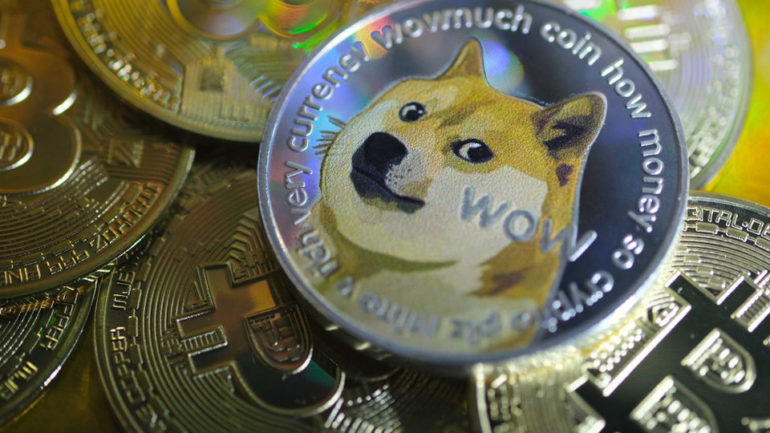Dogecoin, the cryptocurrency branded after a viral dog meme from years ago, hit a new all-time high Friday afternoon. It now has a market capitalization of about $92 billion following a six-month climb of more than 26,000 percent.
Over that same time period, the S&P was up 19 percent, while crypto rivals bitcoin and ether were up 286 percent and 698 percent, respectively, according to CoinMarketCap. And stock market darling Tesla? It is up 56 percent since November.
“The joke is on Wall Street this time,” said Mati Greenspan, portfolio manager and founder of Quantum Economics. “What you have is a situation where teens on TikTok are outperforming even the smartest suits by thousands of percentage points.”
In 2013, software engineers Billy Markus and Jackson Palmer launched the satirical cryptocurrency as a way to make fun of bitcoin and the many other cryptocurrencies boasting grand plans to take over the world.
They called it dogecoin – pronounced “doje coin” with a soft “g” sound – after the once-popular “doge” shiba inu meme. Its purpose? To be a faster but “fun” alternative to bitcoin.
“The appeal of dogecoin has always been its honesty,” Galaxy’s researchers Alex Thorn and Karim Helmy explained in a note to clients on May 4. “Unlike many other cryptocurrency projects…there’s no grand vision, no pronouncements about how dogecoin will change the world.”
In addition, while bitcoin has a capped supply of 21 million coins, there is currently no limit to the number of dogecoins that can be created.
“One of the value propositions of bitcoin is digital scarcity; that there will only be 21 million,” said Greenspan. “There is no such hard cap [with dogecoin], and it has a really crazy inflation schedule.”
The Elon Musk effect
It isn’t totally clear when or why dogecoin captured the heart of Elon Musk.
The billionaire Tesla and SpaceX CEO has spent years talking up the token.
Musk’s tweets with sometimes oblique references to dogecoin often send it to new record-high prices. These posts have also helped drive retail investor interest.
“You have this one guy who is sort of like the cult leader,” said Asheesh Birla, a general manager at Ripple, which manages an alternative cryptocurrency used for payments.
Musk, however, isn’t alone in his celebrity endorsement of the animal-branded token. Dallas Mavericks owner Mark Cuban, Snoop Dogg and Kiss bassist Gene Simmons have all publicly rallied behind dogecoin. Even beef jerky brand Slim Jim is getting in on the action.
Its price surge this week, attributed by one analyst to Elon Musk’s upcoming “Saturday Night Live” appearance on May 8, even managed to briefly crash Robinhood’s trading app.
But there is more to dogecoin’s record price run than just celebrity backing.
Market conditions have also been right. Multiple rounds of stimulus checks have meant people have more money on hand to spend. Apps like Robinhood have made it easier than ever for the casual investor to make a bet on stocks, turning day-trading into a pandemic pastime.
There is also the enduring sentiment to “stick it” to the establishment.
“Dogecoin is like this kind of big F-U to the system,” said Avi Felman, Head of Trading at BlockTower Capital. “It’s like, ‘Yeah, this thing can have value, too. And I’m just going to buy it, because I’m going to buy it.'”
Experts say the dynamic is reminiscent of the GameStop trading frenzy from earlier this year.
“Elon is basically pushing up this message of, ‘Why can’t dogecoin have value?'” said Felman. “It’s part of the GameStop boom. People like these narratives. They like these stories. They like these jokes. And dogecoin just captured the mind and imagination of every single retail investor.”
The rise of commission-free trading through online brokerage apps like Robinhood also made it easier than ever to buy into crypto.
“You have a rabid online community,” Birla said of the fanbase of doge evangelists. “You have Twitter and Reddit, where they’re all sort of congregating and thinking about how to pump dogecoin.”
Valuing dogecoin
The question of whether dogecoin holds value is debatable.
At the moment, there are very few use cases for the token. Though more merchants are starting to accept dogecoin as a method of payment, it is nowhere near the level of adoption necessary to be used as any sort of actual currency substitute.
“These days it’s all one big marketing ploy,” said Mike Bucella, BlockTower Capital general partner.
Unlike rival cryptocurrencies such as ethereum, which let programmers build applications on their platform to do things like lend and borrow money, there isn’t much anyone can do with dogecoin.
Dogecoin isn’t really a reliable store of wealth either, given that this typically requires a certain degree of long-term faith in the coin and the blockchain upon which it’s been built.
“If you look at the dogecoin protocol itself, I don’t even know if there’s anyone over the last several years who has added new functionality or code to it,” said Birla. “Dogecoin doesn’t really have a development team behind it.”
Given these limitations, the run-up in dogecoin appears to be purely speculative. Dogecoin has value because other people believe that it has value. And because they believe that someone else is willing to buy it from them at a higher price.
“We see dogecoin rising in price as a factor of low liquidity and extreme growth in the network,” explained Greenspan. “Once the network does reach critical mass, I don’t think that type of growth is sustainable.”
But all is not lost for the future of dogecoin.
“The real value is in today’s meme-driven culture, and doge represents the network value of memetics, which may prove to be enormous,” explained Bucella. “If at some point, the doge community decides to implement a burn or new supply mechanism, via a protocol hard fork, then this value will have a higher likelihood of being retained long-term.”
Disclosure: “Saturday Night Live” is a TV show of NBCUniversal, the parent company of CNBC. CNBC owns the exclusive off-network cable rights to “Shark Tank,” which features Mark Cuban as a panelist.



